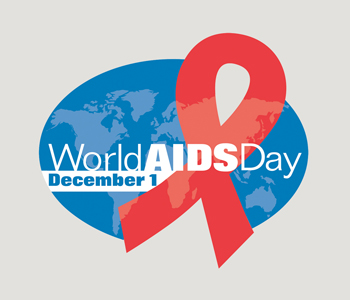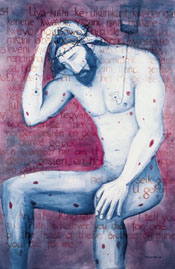For Sunday December 4, 2016
Second Sunday in Advent and World AIDS Day
Lectionary Readings (Revised Common Lectionary, Year A)
Isaiah 11:1–10
Psalm 72:1–7, 18–19
Romans 15:4–13
Matthew 3:1–12
A guest essay by Arthur J. Ammann, MD, the former Director of the Pediatric Immunology and Clinical Research Center at the University of California Medical Center in San Francisco. In 1982, Ammann documented the first cases of AIDS transmission from mother to infant, and also the first blood transfusion AIDS patients. In 1998 he founded Global Strategies for HIV Prevention, and in 2011 the blog Ethics in Health.
Advent is a time of remembrance and hope for the Christian community and all that it touches. On December 1, during our sacred season of Advent, some of us are asked to participate in the secular commemoration of World AIDS Day, which was first initiated in 1988 to call for global awareness about HIV and AIDS.
Since the discovery of AIDS in 1981, over 50 million men, women and children have become infected or died from HIV, in spite of the availability of highly effective prevention and treatment measures. World AIDS Day reminds us all that the epidemic has not stopped. To help us remember, and trigger action, World AIDS Day is commemorated in key geographic areas, highlighted in the media, and associated with annual slogans worldwide.
In 2016, the slogan is “Hands Up for #HIVPrevention.” But after almost 30 years, the epidemic is still with us. Clever slogans that cater to the pervasive mythology that social media can invoke enduring change don’t seem to work. Something more is needed.
 |
An alternative to slogans are theologically sound truths that have survived history — these are stories, instruction, and teachings that we read during Advent that call for change. Their origin in a Judeo-Christian ethic should not prevent their worldwide application.
This year’s Advent Scriptures point to the enduring principles that were spoken by God and the prophets, not as marketing tools, but as guidelines for living. Isaiah 11:1–10 tells us that the spirit of wisdom and understanding leads to our recognizing the needy and to asking for justice for the poor.
Psalm 72 tells us that the justice of God will deliver the needy, and will rescue them from oppression, violence, and death.
In Romans 15:4-13, Paul reminds us that what has been said in Judeo-Christian history endures.
And in this week's gospel from Matthew, John the Baptizer calls us all to repentance, to prepare the way for the Lord, and, most important of all, to "produce fruit" that authenticates our repentance.
 |
|
"Man of Sorrows: Christ with AIDS," 1993, by Maxwell Lawton, Painter and Activist, April 27, 1956 - September 16, 2006.
|
These are not catchy slogans designed for social media, but promises qualified only by the fact that we must believe in them and act on them. “For everything that was written in the past was written to teach us.”
The HIV epidemic has all of the features that the Scriptures and the teachings of Jesus focus on. We review these during Advent — pain, suffering, stigma, discrimination, poverty, disease, refugees, and injustice.
We reflect on these teachings and claim that they are what we believe. We examine not only their impact on our personal lives but the impact that they could have on lives throughout the world. Pausing in the midst of Advent to look at a specific disease such as HIV/AIDS should help us to see through a cloud of indifference and hostility that seems to have descended on us all and obscured our obligation to do more for those who suffer.
As we look at a world and a country that seems to have drifted into increasing hostility, we ask where are our Christian teachings? And I wonder — perhaps it is time for us also to ask if some of our theological principles have regressed into mere slogans.
Image credits: (1) Illinois Public Health Association and (2) TheBody.com.





